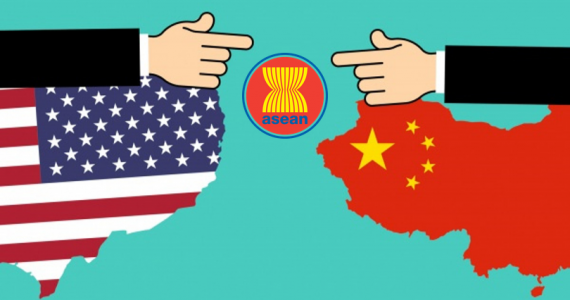
USA-ASEAN-CHINA. Foto has taken from www. ifair.eu
STRATEGIC ASSESSMENT. Since China’s post-COVID opening in January of this year, Chinese leader Xi Jinping and his army of diplomats have begun intensifying their campaign for China’s Global Security Initiative (GSI). Xi first proposed the GSI last April, offering few details but saying the initiative would “promote security for all in the world.”
Beijing has since elaborated in more detail through a Ministry of Foreign Affairs concept paper and has connected the GSI to its peace plan for Ukraine and the rapprochement it brokered between old rivals Iran and Saudi Arabia. Above all, the initiative aims to promote a vision of an alternative to the U.S.-led international order.
While the GSI has gained traction with some states, the recent trips to Washington by the South Korean and Philippine presidents show that even in China’s neighborhood, many countries still see Washington as the world’s leading strategic security partner.
According to reports in the media, the North Atlantic Treaty Organization (NATO) will establish its first Asia office in Japan in order to broaden its influence in the Asia-Pacific region.
According to a report by Nikkei Asia, the liaison office in Tokyo “will allow the military alliance to conduct periodic consultations with Japan and key partners in the region, such as South Korea, Australia, and New Zealand, as China emerges as new challenges, in addition to the traditional focus on Russia.”
China’s foreign minister told the U.S. ambassador that Washington is responsible for the downturn in relations between the two countries and must “reflect deeply” before ties can return to a healthy track, an official said.
Qin Gang’s comments follow a suspension of serious dialogue on a range of issues between the world’s largest economies, increasingly at odds over tariffs, attempts by Washington to deprive China of cutting-edge technology, and China’s claims to self-governing Taiwan and large parts of the South and East China Seas.
U.S. President Joe Biden will sign defence and surveillance agreements with Papua New Guinea, the island nation’s foreign minister said, on a visit that renews the strategic importance of the nation where Biden’s uncle died in World War Two.
PNG, the South Pacific’s most populous nation, will also see a doubling of U.S. development assistance to $32 million, including $25 million to tackle its security priority of climate change, State Department documents submitted to the U.S. Congress show.
White House national security adviser Jake Sullivan told senior Chinese foreign policy adviser Wang Yi during talks in Vienna this week that the Biden administration is “looking to move beyond” tensions spurred by the U.S. shooting down a Chinese spy balloon that traversed the continental United States, according to a senior Biden administration official.
The meeting was not publicized by Washington or Beijing ahead of the high-level talks on Wednesday and Thursday in the Austrian capital. The White House described the wide-ranging discussions, in which the two leaders spent more than eight hours together, as “candid” and “constructive.”
According to James Guild, expert in trade, finance, and economic development in Southeast Asia on the Diplomat, because telecommunications play a pivotal role in the collection and transmission of information, geopolitics and national security are often inseparable from more mundane commercial interests when countries build national data networks. This has become increasingly acute as there are only a few companies in the world capable of providing next generation network infrastructure, and China’s Huawei is one of them.
With tension between the United States and China on the rise, telecommunications is becoming an increasingly fraught area of international competition and this has started to filter down into Southeast Asia. The European Union and United States recently warned Malaysia about the national security risks of using Huawei to build its 5G network, for instance.
Unsurprisingly, countries in the region have adopted a range of approaches and differing levels of engagement when it comes to Chinese involvement in their national telecom sectors. In 2020, Singapore’s leading mobile operators decided against using Huawei to develop national 5G networks, with contracts going instead to Ericsson and Nokia.
It’s not clear this was influenced by geopolitics – it could easily have been a commercial decision, as Singtel has a long business relationship with the European firms. In Vietnam, on the other hand, where all three major telecom operators are state-owned, decisions do seem more informed by national security concerns as there is apparently strong reluctance to use Huawei equipment or allow a significant role for China in national telecom infrastructure.
In Indonesia, telecom operators are a mix of private, foreign, and partially state-owned companies who are more responsive to market dynamics. The sector has shown considerable openness toward Huawei, as their equipment is typically cost competitive and comes with upskilling for Indonesian workers and these incentives generally outweigh any national security concerns.
Notably, however, Chinese entities do not hold significant ownership stakes in any of Indonesia’s largest telecom operators (Telkomsel, XL Axiata, or Indosat Ooredoo Hutchison) nor do they have significant financial claims that could be used as geopolitical leverage.





